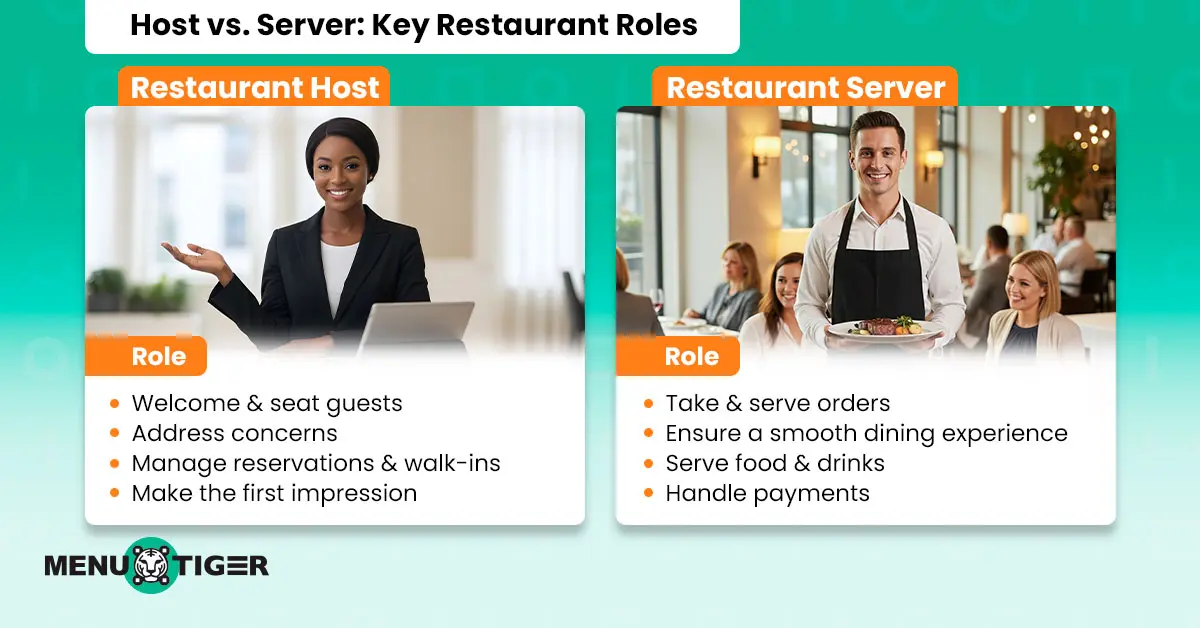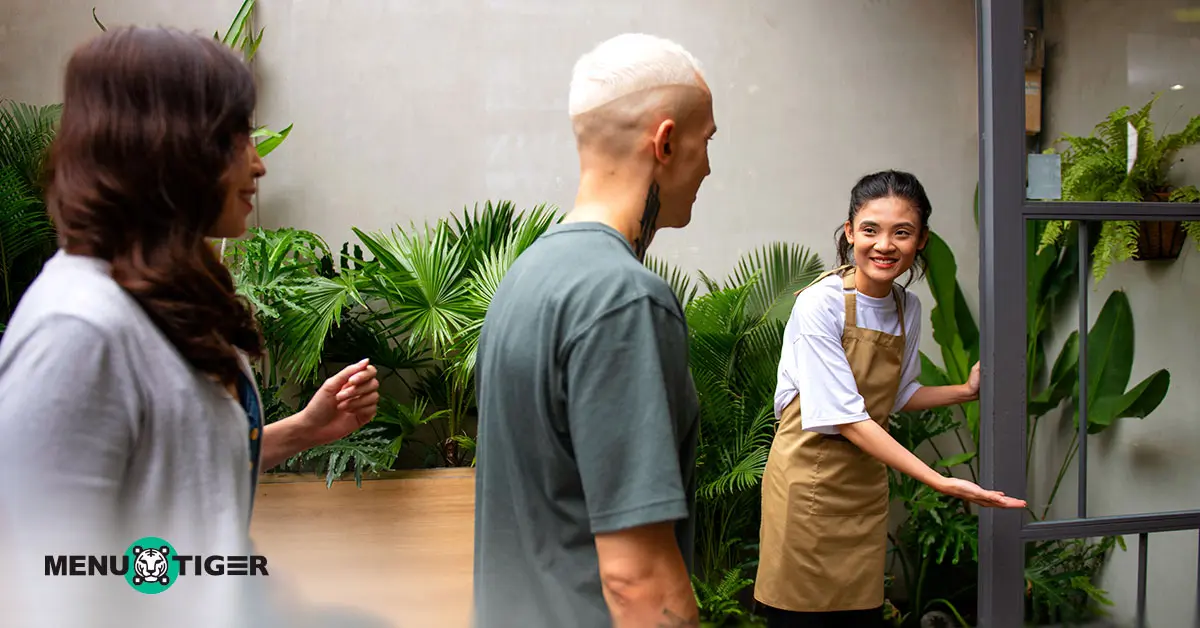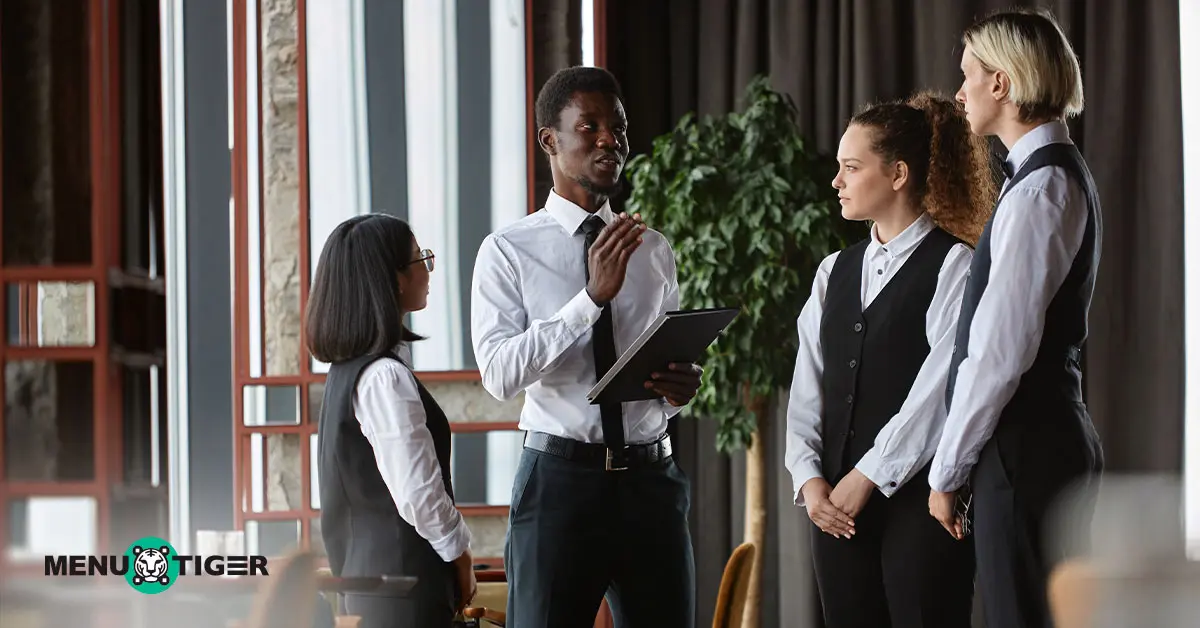
Host Restaurant 101: Key Responsibilities Explained
Last Updated: September 29, 2025
Every restaurant owner knows the food needs to be excellent, but many overlook the single moment that seals a customer’s decision to stay or leave: the first five seconds.
Too many owners view the host restaurant stand as an entry-level job. But here’s the reality: they are the front-of-house team members who deliver the most critical first impression.
Why does this role matter so much? Because a single misstep, a grumpy greeting, a chaotic waitlist, or a lack of attention is enough for a customer to walk out the door and never return.
That is a situation you absolutely must avoid. So, this article will dive into exactly why your host is your biggest advantage, and we'll show you how ordering systems can help them excel.
What is a host at a restaurant?
You know that friendly face that greets you right as you walk in? The one who navigates the entryway with a calm smile, clipboard or tablet in hand? That's the host or also known as the greeter.
They are the front-of-house team members who are usually the first people guests interact with when they arrive.
Their main role is to create a warm, welcoming first impression, manage the flow of guests in the dining area, and creates an experiential dining atmosphere built on care
What's the difference between a server and a host at restaurants?
Don't argue about host vs. server restaurants because they clearly have different roles. Here are their key responsibilities that set them apart:

The host is responsible for managing the guest’s arrival and first impression, handling seating and reservations, and addressing any concerns at the door.
The server takes over once guests are seated, focusing on taking orders, serving food and drinks, suggesting food and drink pairings ideas and managing the overall dining experience
How much does a host restaurant make?
- According to ZipRecruiter, the average hourly pay for a host is $14.17, with a salary range from $7.21 to $19.47. The majority of hosts earn between $11.54 and $16.11 per hour.
- Indeed reports an average hourly wage of $13.66 for hosts and a daily tip average of $35.00 based on over 47,000 salary submissions.
- The average annual salary for a host is approximately $30,750, equating to about $14.78 per hour. This figure aligns with the national average, with top earners reporting up to $38,830 annually.
- According to Salary.com, the average annual salary for a host is $29,420, which breaks down to an hourly rate of approximately $14.
What does a host do at a restaurant?
The host's responsibility is paramount because they deliver the critical first impression. A single negative interaction results in the loss of customers.
Unlike slow friendship, they won't say, “I thought your service was bad at first, but as I slowly experienced more, I found something sweet.” No, they will simply not return.
That’s why knowing the responsibility of a host is an edge: You can then see how your staff impacts your business.
1. Greeting guests

The host is the face of the restaurant. Their friendliness, professionalism, and tone of voice set the stage for everything that follows.
For this, you can ask your host to formulate a signature greeting.
2. Managing reservations and waitlists
They're the friendly face who gives you a great initial welcome, but their real job is strategic: they expertly juggle reservations like a restaurant reservation system and the waitlist.
Crucially, they manage the customer's experience of waiting. Telling a guest the honest wait time with a kind, professional attitude can be the difference between the customer deciding to stay and dine or leaving and not returning.
3. Escorting guests to their tables
Beyond a polite “follow me,” the host guides the guests directly and confidently to their spot, making them feel cared for.
They hand off the party smoothly to the server, ensuring the start of table service is seamless.
4. Managing guest expectations during waits
Honesty is key here. The host accurately tells guests how long the wait will be, but more importantly, they deliver that news professionally and kindly.
Their ability to manage the uncomfortable feeling of waiting often determines if a person stays, enjoys a meal, walks out, and never returns.
5. Balancing the dining room
The host doesn't just fill empty tables; they strategically assign tables to servers to ensure no single person gets overwhelmed.
This thoughtful rotation is critical for preventing slow service and kitchen backups, keeping the whole restaurant operating steadily and fairly.
6. Answering phones and inquiries

Whether it’s confirming reservations, handling takeout requests, answering questions, or managing restaurant technology in place, hosts are often the first voice guests hear.
7. Maintaining cleanliness and organization
The host ensures the front entrance and host station are spotless and tidy. A clean entry signals that the entire restaurant pays attention to detail, reinforcing that crucial positive first impression.
8. Handling guest concerns
When a guest shows up already stressed or unhappy (maybe about the wait time or a seating choice), the host acts as the first diplomat. A skilled host listens patiently, diffuses the tension, and quickly solves the minor issue, enhancing the customer's experience and often turning frustration into a saved night for the customer.
9. Monitoring guest flow throughout the meal
This is the ongoing check-in. The host watches the dining room, noting which tables are done eating, which need a check, and which might linger.
This helps them accurately predict when the following table will be free, which directly feeds back into their ability to quote accurate wait times.
10. Coordinating with the service team

Hosts act as the bridge between front-of-house and back-of-house. They constantly share critical updates with the servers, bussers, and kitchen staff.

Key tips on how to find the right host restaurant
Since you already know their responsibilities (Greeting, Logistics, Problem-Solving), your hiring focus should be on the traits and skills that enable them to succeed in those demanding situations.
Here are some things you can do:
1. Focus on their personality
A great restaurant host is the crucial first impression and the logistical quarterback of the dining room. Your hiring focus should be on innate personality traits over just experience.
Look for candidates who demonstrate genuine warmth and high emotional intelligence (EQ) to manage guest moods. They must remain calm under pressure during peak service and exhibit strong attention to detail for accurate seating and organization.
2. Ask situation questions

Evaluate how candidates handle real-life scenarios rather than relying on rehearsed answers. Here are some sample questions:
- A large party arrives without a reservation during peak hours. What would you do?
- You accidentally double-booked a table, and two parties arrived simultaneously. How would you resolve this?
- A VIP guest shows up unexpectedly, but the restaurant is full. How would you accommodate them?
- It’s a very busy night, phones are ringing, and guests are waiting at the door while servers report delays. How do you manage the situation without letting anyone feel neglected?
- A guest complains that another party at a nearby table is loud or disruptive. How do you handle the situation without upsetting either party?
3. Challenge their skills
The key is to simulate real pressures instead of just asking hypothetical questions. This prevents candidates from giving rehearsed “textbook” answers and lets you see who can actually perform when the restaurant is busy.
4. Debrief their thought process
After every role-play or situational drill, immediately debrief the host candidate's thought process by asking why they chose that specific action, what factors they considered, and what their prioritization strategy was.
5. Assess alignment with restaurant culture
A host’s demeanor should match the restaurant’s vibe, whether casual, high-energy, formal, or relaxed. Look for personality, guest interaction style, and team communication that naturally reflect and support the restaurant’s atmosphere. This ensures a consistent experience for both guests and staff.
For example, if you have a Chinese restaurant, you might look for a host who respects cultural customs, greets guests warmly but politely, and is attentive to details like seating preferences or family-style dining arrangements.
Their approach should make guests feel welcomed while reflecting the restaurant’s cultural and dining style.
Upscale your restaurant's host operations with order management
Being a host is not an easy job. Make it a little easier for them by adding extra touches that ordering system into restaurant host software alike, while also improving the overall service of your restaurant with restaurant order system features:
Table-side ordering

A reliable menu management system often includes features that allow hosts to see which tables have active orders through a QR code menu feature. This helps them quickly identify which tables are occupied and which are available, making it much easier to manage seating for walk-in customers.
Restaurant waiter call button
Since it’s also part of their job to handle guest concerns, a restaurant waiter call button can be very helpful for hosts and staff because it reduces the need to micromanage every single table. With just one tap on a mobile phone or digital menu, guests can easily call for service.
This makes operations more efficient, minimizes wait times for service, and improves the overall dining experience for both customers and staff.
Digital survey
Who would have thought that a restaurant order management system could also let you collect customer feedback?
Hosts can easily gather real-time opinions and ratings from diners through digital surveys. This information helps hosts understand guest satisfaction, identify areas for improvement, and address any concerns promptly.

Ready to invite customers at the front door?
You now have a clear understanding of why the host is the single most valuable player on your floor. You might get confused about whether you would rather hire a host restaurant or fully implement a menu management system.
The answer is simple: have both! That way, you get the best of both worlds. After all, who doesn’t want the best for their restaurant?
The truth is, even the best host needs the best tools, and the best tools need a skilled person to operate them. Don't let your most critical employee struggle with guesswork and outdated systems. Give them the advantage of technology as well.
FAQS
Eulla
Eulla joined MENU TIGER’s Content Team with a foundation in English teaching. She combines language expertise and creativity to produce engaging content that educates audiences and drives meaningful results.


